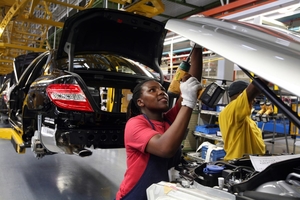
FHH wins “Athar Award” for best practices in sustainability, CSR in Egypt
Fine Hygienic Holding (FHH), one of the world’s leading wellness groups and manufactures of hygienic ...

2023 is a year of step change for the African automotive industry, with five hub countries – Ghana, Cote d’Ivoire, Nigeria, Egypt and Kenya –either implementing progressive automotive policies or due to approve and implement such policies, the World Economic Forum (WEF) said in a recently published article.
“2023 is a year of step change for the African automotive industry,” said Dave Coffey, CEO of the African Association of Automotive Manufacturers (AAAM).
Other African countries are exploring their competitive advantage. Up to now, only Morocco and South Africa have successfully and competitively industrialized their automotive industries with production volumes of around one million vehicles.
There is an understanding that not every country can assemble a vehicle – hub countries will assemble vehicles with neighboring economies sharing in the value chain determined by their competitive and sustainable advantage – and much work is taking place on the ground to explore and develop value chains with regional collaboration key to driving scale.
The annual importation of 3 million to 5 million used cars into Africa, is an unregulated environment with many cars being unroadworthy and with outdated emission standards. A used vehicle ecosystem is key for affordable mobility, but the source will transition to vehicles assembled in Africa which will comply with minimum standards.
The transition to new energy vehicles will depend on affordability and differ across mobility segments, with two- and three-wheelers setting the pace along with public transport in major cities.
Regulating the condition of imported used vehicles into Africa will also play a significant role in initially reducing carbon emissions. Effectively industrializing and growing the auto sector whilst providing affordable mobility is a huge employment opportunity for the continent.
The AAAM, the African Continental Free Trade Area (AfCFTA) Secretariat, the African Union Commission, United Nations Economic Commission for Africa, Afreximbank and African Organisation for Standardisation have developed an auto strategy for the continent that was adopted as a living document by the Council of Ministers of African countries in Botswana in February 2023.
This strategy includes the formation of an AfCFTA Automotive Task Force to implement the strategy. Never before has Africa seen such alignment; the right players are in the room with growing support from African governments.
Road mobility accounts for about a quarter of global energy-related carbon emissions and is increasing, so its decarbonization is critical for global climate crisis mitigation. Cars account for the largest portion of increasing emissions sources globally, making the transition to zero tailpipe emissions attractive, especially to electric vehicles (EVs) in developed markets.
It is no wonder that major developed markets committed to the phase out of internal combustion engine vehicles and EV value chains investments. Luckily, despite the backdrop of supply chain disruptions, geopolitical shocks, and high commodity and energy prices, electric vehicles sales (hybrid and pure) exceeded 10 million last year, up 55% relative to 2021.
اترك تعليقا